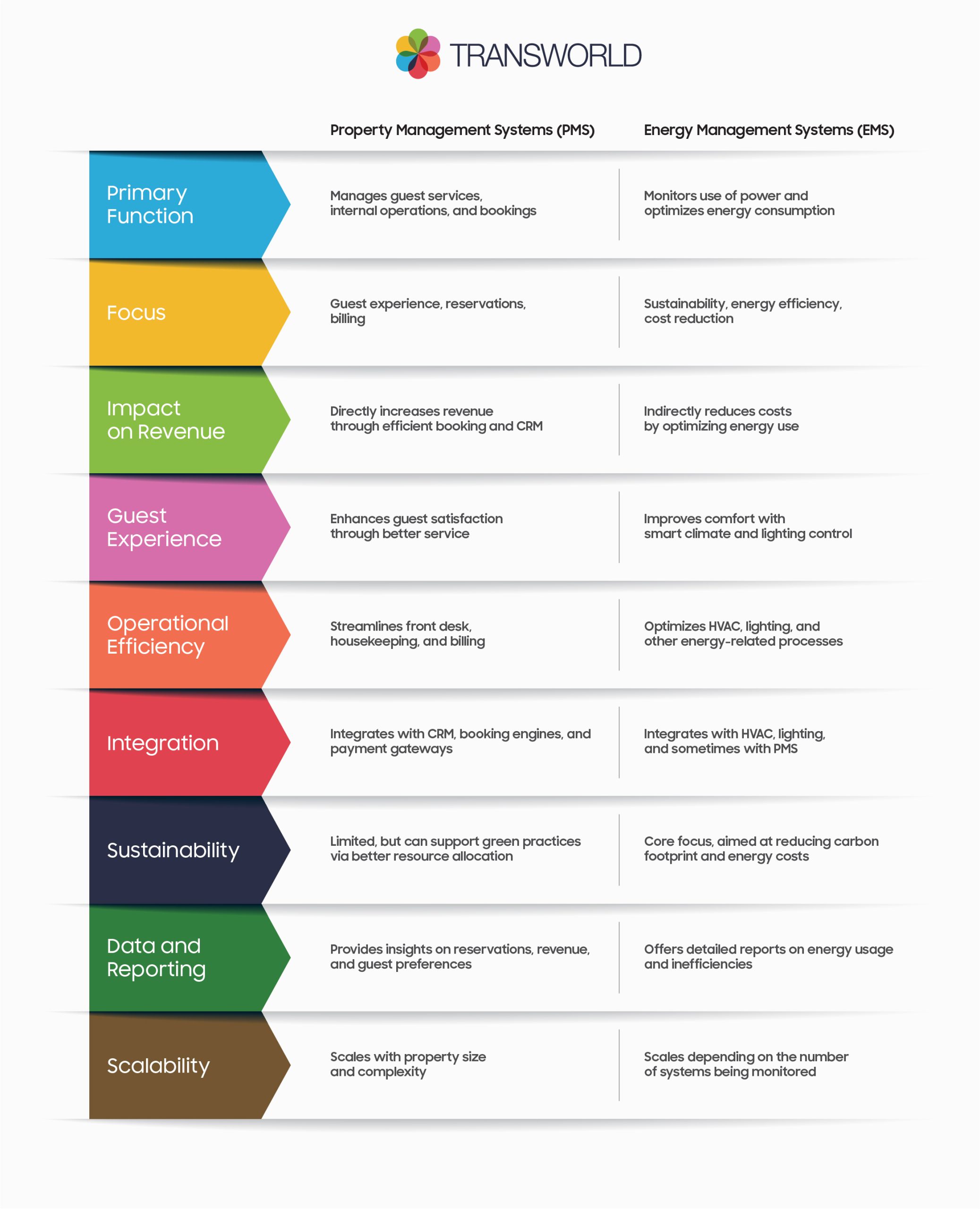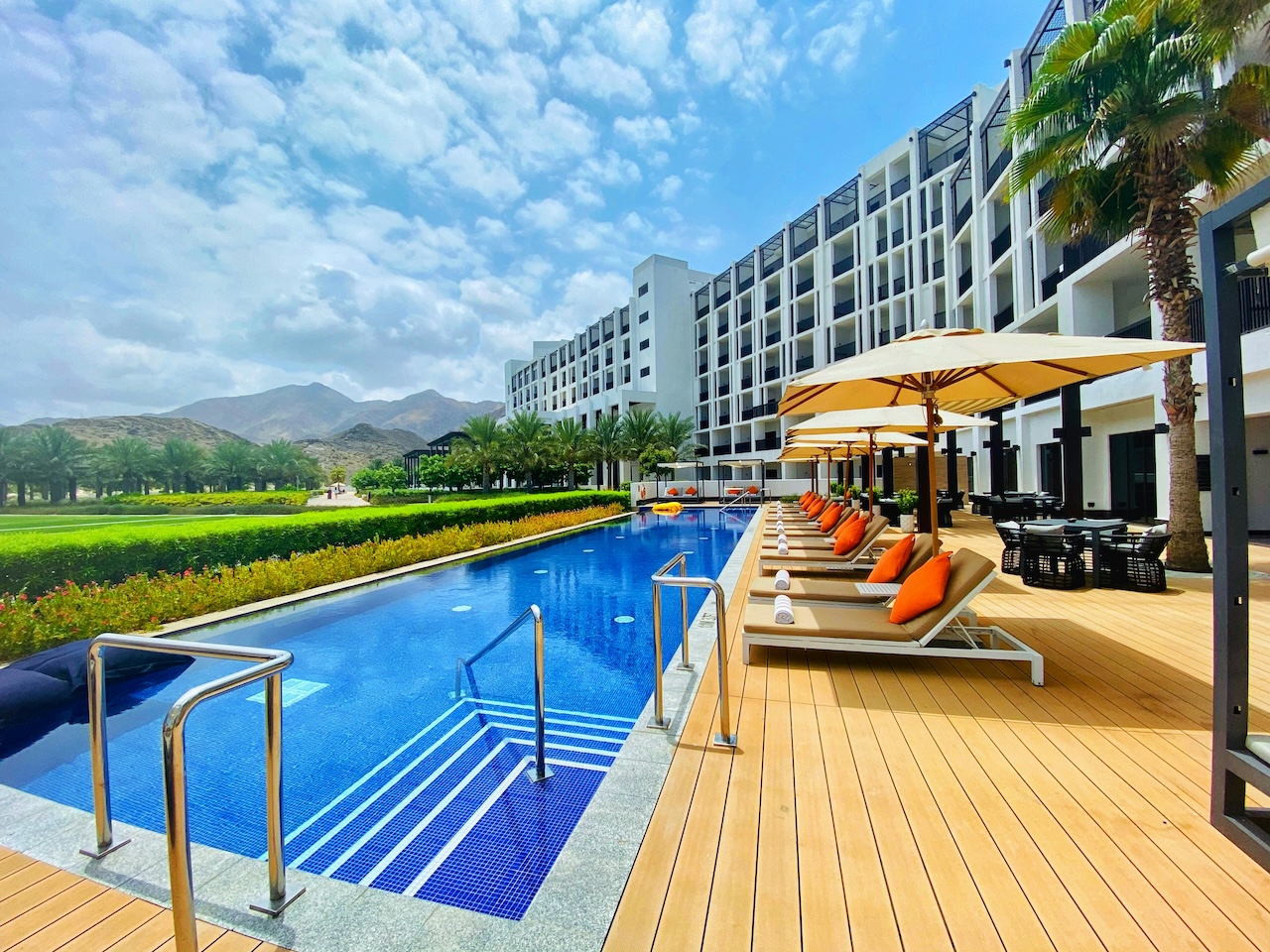

These days the hospitality industry, like all other business sectors, relies heavily on advanced technology. The tech resources help enhance guest experiences, streamline internal operations, and optimize the use of resources. Two critical systems that are integral to this industry's technological ecosystem are Property Management Systems (PMS) and Energy Management Systems (EMS). While both systems serve different functions, they are essential to the overall efficiency and sustainability of hotel operations. Understanding the distinctions between the two can help hoteliers decide which system to prioritize based on their specific needs.
Here's a breakdown of PMS and EMS covering their key features and benefits respectively.
A Property Management System (PMS) is a comprehensive software solution designed to manage and automate various administrative tasks of a hotel or any hospitality business. It centralizes data, enhances efficiency across many channels, and improves guest satisfaction by handling everything from reservations to check-ins, billing, and housekeeping.
Key Features of PMS:
Reservation and Booking Management: Property Management Systems allow hotels to manage bookings from multiple channels, such as direct reservations, OTAs (Online Travel Agencies), and even walk-ins. This feature ensures smooth check-in / check-out processes and minimizes over-bookings.
Front Desk Operations: The system streamlines front desk tasks, i.e.: room assignment, guest check-in / check-out, and managing guest information. This allows staff to work more efficiently on management tasks and focus more time on the guest relationships and experience.
Billing and Invoicing: PMS integrates guest billing, including room charges, additional services (like spa or dining), and external bookings. This ensures accurate financial reporting and streamlined payment processes.
Housekeeping and Maintenance: PMS includes modules for managing housekeeping schedules, ensuring that rooms are cleaned and maintained in a timely manner. Maintenance requests can also be easily logged and tracked.
Customer Relationship Management (CRM): Advanced PMS solutions offer CRM features, which enable hotels to manage guest profiles, preferences, and history. This data can be used to personalize guest experiences, leading to improved customer loyalty.
Reporting and Analytics: PMS provides a range of customizable reports related to occupancy rates, revenue per available room (RevPAR), and guest demographics. This data helps in strategic decision-making and operational efficiency.
Benefits of PMS:
Enhanced guest experience through personalized services.
Efficient management of reservations and front desk operations.
Streamlined billing, invoicing, and housekeeping processes.
Real-time reporting and performance tracking.
Improved communication between departments.
In contrast to a PMS, an Energy Management System (EMS) is designed to monitor, control, and optimize a hotel’s energy consumption, focusing on sustainability and cost reduction. As energy is one of the most significant operational costs in hospitality, implementing an EMS can significantly reduce costs and environmental impact.
Key Features of EMS:
Energy Monitoring: Energy Management Systems allow hotels to monitor energy usage across different departments and areas. They also provide real-time data on consumption patterns.
Automated Climate Control: The system integrates with PTACs / ACs and HVAC (Heating, Ventilation, and Air Conditioning) systems to optimize heating and cooling based on occupancy. For example, when a room is vacant, the system can reduce energy use automatically.
Lighting Control: EMS often includes smart lighting systems that adjust based on occupancy, time of day, and natural light availability, further reducing energy waste.
Integration with PMS: Some EMS solutions integrate with PMS, allowing the energy system to adjust based on guest preferences, room bookings, and check-in / check-out times. This coordination ensures that energy is used efficiently while maintaining guest comfort.
Energy Reporting: EMS generates reports on energy usage trends, identifying areas of high consumption or inefficiency. This data helps management make informed decisions on energy-saving initiatives.
Sustainability Tracking: Hotels can track their carbon footprint, water usage, and other sustainability metrics to comply with environmental regulations and demonstrate their commitment to green practices.
Benefits of EMS:
Reduced operational costs through optimized energy consumption.
Improved sustainability by reducing energy waste and carbon footprint.
Enhanced guest comfort with automated climate and lighting controls.
Detailed energy usage reports to guide efficiency improvements.
Integration with other hotel systems for a more cohesive operation.

Comparative Category | Property Management Systems (PMS) | Energy Management Systems (EMS) |
|---|---|---|
Primary Function | Manages guest services, internal operations, and bookings | Monitors use of power and optimizes energy consumption |
Focus | Guest experience, reservations, billing | Sustainability, energy efficiency, cost reduction |
Impact on Revenue | Directly increases revenue through efficient booking and CRM | Indirectly reduces costs by optimizing energy use |
Guest Experience | Enhances guest satisfaction through better service | Improves comfort with smart climate and lighting control |
Operational Efficiency | Streamlines front desk, housekeeping, and billing | Optimizes HVAC, lighting, and other energy-related processes |
Integration | Integrates with CRM, booking engines, and payment gateways | Integrates with HVAC, lighting, and sometimes with PMS |
Sustainability | Limited, but can support green practices via better resource allocation | Core focus, aimed at reducing carbon footprint and energy costs |
Data and Reporting | Provides insights on reservations, revenue, and guest preferences | Offers detailed reports on energy usage and inefficiencies |
Scalability | Scales with property size and complexity | Scales depending on the number of systems being monitored |
The decision to prioritize a PMS or EMS depends on a hotel’s specific needs:
For guest-centric operations: A PMS is essential for managing day-to-day hotel operations, improving guest satisfaction, and optimizing bookings. Small to mid-size hotels may prioritize a PMS as it directly impacts revenue generation and operational efficiency.
For sustainability and cost control: Larger properties, or those with high energy consumption, may find an EMS more beneficial, especially if they are looking to reduce operational costs and enhance sustainability. There is an increase in pressure for businesses to adopt green practices, so Energy Management Systems become crucial in improving a hotel's environmental footprint.
In many cases, especially for larger or high-end / luxury properties, integrating both systems offers the best of both worlds. A PMS enhances guest experience and operational efficiency, while an EMS drives cost savings and sustainability efforts in the hospitality industry.
Supplemental Info: Find out about hotel systems integrators, what they are and the benefits they bring to hotels around the world.
Both Property Management Systems and Energy Management Systems are integral to the modern hospitality industry. A PMS focuses on the core operational aspects of running a hotel and operational efficiency, which ultimately allows more time to be focused on improving the guest experience. On the other hand, an EMS provides long-term cost savings by optimizing energy consumption and promoting sustainability.
Ultimately, combining the two systems can lead to a holistic approach to management. The results can be two-fold with improved guest satisfaction and operational efficiency while addressing environmentally conscious concerns.

Explore the best hotel technology conferences 2026 in the U.S. and around the world. See dates, locations, and keynote highlights.

Here are nine key points you should consider before opening a hotel. We’ll go into each point more in depth in separate articles linked here.
Fill out the form below to request more information.

